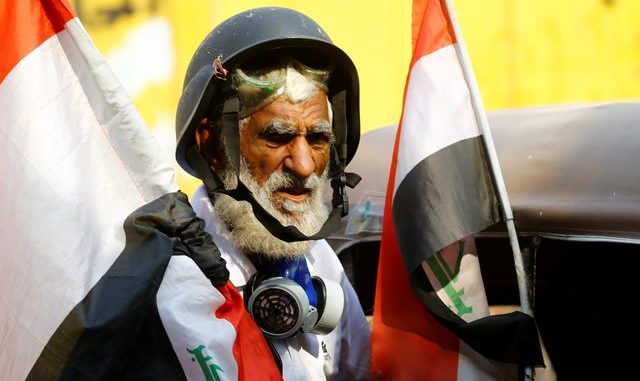
Security forces fired tear gas at anti-government protesters in Baghdad on Sunday injuring at least 22 people, police and medical sources said, a day after they pushed demonstrations back toward one main square in the Iraqi capital.A demonstrator holds the Iraqi flag during the ongoing anti-government protests in Baghdad, Iraq November 10, 2019. REUTERS/Alaa al-Marjani
One person died in hospital of wounds sustained in clashes the previous day, the sources said. Security forces on Saturday pushed protesters back from bridges they had sought to control during the week.
Police said late on Sunday that a car had exploded in an area under the control of security forces setting fire to several other vehicles parked next to it, with no casualties caused. Protesters fear that saboteurs might try to use the unrest to carry out attacks, which risks drawing a harsher crackdown by security forces, and the government has warned against the use of violence against state property or personnel.
“They’re (security forces) still shooting at people, wounded are coming in,” volunteer medical worker Hayder Ghareeb said earlier in the day at a makeshift clinic in Tahrir Square, now the main gathering point for demonstrators in Baghdad.
Some of those hurt had choked on tear gas and been taken to hospital, medical sources said.
No deaths were immediately reported on Sunday, however, making it one of the calmer days in weeks of unrest that erupted in Baghdad with protests over lack of jobs and services and have spread across much of southern Iraq.
Security forces have used live ammunition, tear gas and stun grenades against mostly young, unarmed protesters, killing more than 280 people, according to a Reuters tally based on medical and police sources.
Prime Minister Adel Abdul Mahdi’s government has taken some measures to try to quell unrest including handouts to the poor and job opportunities for graduates, but has failed to keep up with growing demands of demonstrators who are now calling for an overhaul of Iraq’s sectarian political system and the departure of its entire ruling elite.
Under pressure from powerful Shi’ite Muslim religious authorities, it has recently pledged more serious change such as electoral reform and has recognized the legitimacy of peaceful protest.
Iraqi leaders agreed at a meeting in Baghdad on Sunday that imminent electoral reform should give a greater chance for youth to participate in politics and break a monopoly on power by political parties that have dominated state institutions since 2003, state media reported.
The unrest is one of the biggest and most complicated challenges to the current ruling elite since it took power after the U.S. invasion and toppling of dictator Saddam Hussein in 2003.
Iraq has suffered decades of war, sanctions and more recently sectarian violence. The last major Sunni-Shi’ite civil strife took place during the rule by the Sunni extremist Islamic State of much of the north and west of Iraq. The country had enjoyed rare calm after the jihadist group’s defeat in 2017.
The current protests are free of sectarian rhetoric: directed by mostly Shi’ite protesters against a government dominated by Shi’ite politicians and powerful allies of Iran.
Many Iraqis want serious political change but also fear the consequences or prolonged instability as armed groups compete for power and the armed forces, with Western help, continue to battle Islamic State militants in northern parts of the country.
In northern Iraq on Sunday near the city of Kirkuk an explosive device detonated hitting a vehicle carrying Italian special forces, injuring five soldiers, the Italian military said.
Reporting by John Davison, Baghdad bureau; Writing by John Davison; Editing by Frances Kerry and Lisa Shumaker
BAGHDAD (Reuters) –
